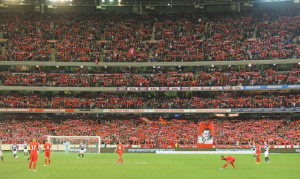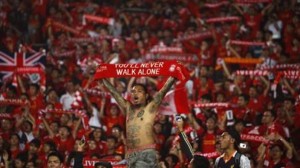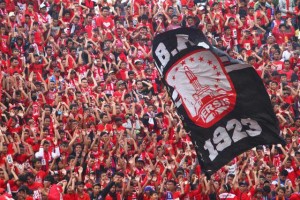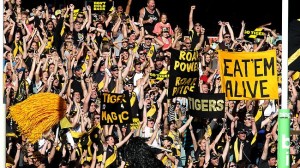This is a terrible season. This season is one disappointment after another. And yet, we keep coming back for more. We have to show our loyalty. We have to show our resilience. Yet again. Yet a-bloody-gain. The team is lost for a solution. Dimma’s demeanor has evolved from being angry at losing, to being convinced that ‘we would work our way through it’ to accepting that ‘we an average team’ to ‘doing it for the fans’. ‘No we are not even thinking about finals.’ Yes, that is true. But, over summer, the pass mark was not only to make the finals but to also win a final. I hear that line from The Castle, ‘tell im heez dreemin’.
The pleasures of literature seem considerably safer than the losses of footy, sport. The irony being, if one doesn’t emotionally invest in a football game, or doesn’t invest in a team, it’s intense vicarious pleasures are also not enjoyed. Perhaps ‘Indonesian literature’ is distant from the everyday life of the Richmond Football Club and the weekly habits of going to games or watching them with friends at pubs or at home on a quiet evening. But, during the 2010 season I set myself a task of translating at least 2-3 poems by Afrizal Malna per week before I would go to a game or watch a game. They were the minimum tasks I would complete before giving myself the fraught pleasure of watching the Tiges.
Now, I’m maintaining my reading, but doing it more so in parallel with watching footy, watching sport. The two have to become united. The sport of literature. The literature of sport. There are cross-overs and divergences. Sport is a creative act, neither beneath nor above the arts. I disagree with Coetzee and the snobs who snub sport as being beneath their consideration. Sport – in its multiplicity of forms, cultures, practices – is a universal part of human culture. And thus it is worthy of serious consideration, analysis. Below, I continue my reading of sport – this time, a brief analysis of some soccer-based short stories by Seno Gumira Ajidarma.
***
Seno Gumira Ajidarma (born 1957, Boston), one of Indonesia’s most prominent authors, has contributed to the discourse on soccer in Indonesia through the means of short stories, journalism and academic writings. These writings reflect his trajectory as a writer and also the professions and jobs that he acquires. The earliest of Seno’s writings on soccer that I have found are his two short stories: “Kematian Seorang Pemain Sepakbola” (Death of a Footballer, 1988) and “Sukab Menggiring Bola” (Sukab Dribbles the Ball, 1996). The former is in the collection, Manusia Kamar (Room Person, Jakarta: Haji Masagung) and the latter is in Negeri Kabut (Fog Lands, Jakarta: Grasindo).
“Death of a Footballer” tells the story of Sobrat, the striker of a team that is on the brink of winning the Indonesian domestic league title. Sobrat has been transformed from a hopeless and untalented youth, into the team’s and competition’s leading goal scorer. His mother discouraged him from playing soccer; and his coaches ordered him to find other jobs rather than waste his time at soccer. Eventually they would give in, owing to his persistence, and let him train with the team on the condition that he would do other jobs such as the cleaning of the club rooms, as well as the massaging of the other players after training. Although supposedly Jonggring Salaka’s third-in-line goal keeper, he is finally deployed in attack after injuries to the other strikers. This turns out well, and, he seems to be fulfilling his wish of ‘glorifying the name of his country’. He is idealistic about the meaning of sport: it should not be corrupted by money. And indeed, he turns down overtures to engage in match-fixing. Sobrat meditates in the centre of the pitch at Senayan stadium and imagines the goals he scores. His 17th goal for the season, which he scores in the last minuted of added time, seals the team’s fate as that year’s champions and his fate as the league’s top scorer. But, it is also at that moment which he dies, instantly. Spectators think he has fainted, overcome with emotion: but no he is dead and the coach is crying. No one can explain his death.
“Sukab Dribbles the Ball” takes the discourse of soccer into a more fantastic and literary realm. The character of Sukab is a recurring feature of Seno’s stories, and, in this story, once again he is a figure of whimsy, reflection and gentle resistance. Sukab embodies a desire towards artistry and play. In contrast to the aforementioned Sobrat’s goal scoring and league-title-winning feats, Sukab, on the other hand, is a soccer-player as artist. Sukab dribbles the ball throughout cities, jungles, amongst the ruins of civilisation, deserts, across seas in search of the greatest goal keeper so that he can score the greatest goal of all-time. As he dribbles from town to town, city to city, each city confronts him with their best team as a means of honouring his skills. He dribbles past them all. His dribbling-journey attracts crowds and the media; a helicopter follows him and broadcasts his adventure live. His journey comes to an end when he reaches the North Pole, and in his white uniform, becomes disguised against the backdrop of the great white-expanse. He kicks the ball into the last remaining goal: the gaping hole in the Ozone Layer.
These two short stories are typical of Seno’s style: they are elaborations of everyday life in Indonesia. The two characters – Sobrat and Sukab (perhaps they are interchangeable) – are whimsical losers who perform something great, spectacular and admirable and are lauded by those around them. Yet, they have no interest in their glory and the adulation they receive. Both stories offer little in the way of conflict and provide only indeterminate conclusions. Through these two brief stories, Seno asserts the importance of the play, aesthetics and critical possibilities of soccer.
 Soccer pitch, Yogyakarta, photo by Onyenho
Soccer pitch, Yogyakarta, photo by Onyenho
***
Methinks that perhaps it would be comforting to watch a Tigers game and only treat it as an aesthetic event. Perhaps: watch the first quarter and leave or turn off the television. Perhaps only listen, watch or attend the last quarter. Here is the irony: the people that do watch the game irrespective of the scoreboard, are those for whom the scoreboard matters the most: the coaching staff, the players. Dimma et al always find something to appreciate or critique regardless of what happens – win (occasionally), lose (frequently) or draw (sometimes). It is us fans who are so fixated on winning and losing. We’re addicted, perhaps to the Tiges losing. Perhaps the players know this and thus they returned us to our natural habitat of turning up and watching them lose. I’m imagining Sukab playing for the Tiges. I imagine him in the shape and form of Dustin Martin. Sukab as Dustin Martin endlessly fends off defenders, takes his bold strides and endlessly looks for that goal off in the distance – some 60meters away so that he can kick it through post-high. His chest swells, he looks up, he gives the don’t argue over and over again. Win good Tiges. Or, lose brilliantly, aesthetically, playfully.









